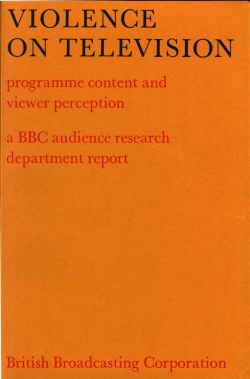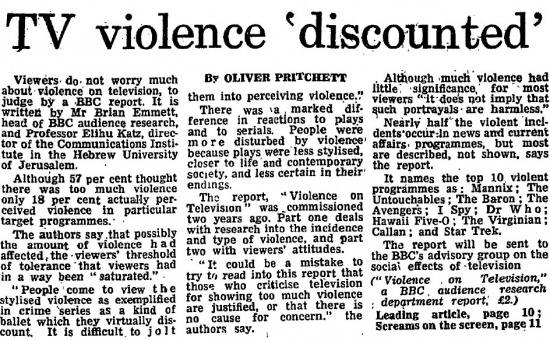Difference between revisions of "TV violence 'discounted'"
John Lavalie (talk | contribs) (Created page with "{{article | publication = The Guardian | file = 1972-01-27 Guardian p22.jpg | px = 550 | height = | width = | date = 1972-01-27 | author = Oliver Pritchett | pages = 22 | la...") |
John Lavalie (talk | contribs) |
||
| (One intermediate revision by the same user not shown) | |||
| Line 1: | Line 1: | ||
| − | {{article | + | {{violence}}{{article |
| publication = The Guardian | | publication = The Guardian | ||
| file = 1972-01-27 Guardian p22.jpg | | file = 1972-01-27 Guardian p22.jpg | ||
| Line 28: | Line 28: | ||
The report, " Violence on Television " was commissioned two years ago. Part one deals with research into the incidence and type of violence, and part two with viewers' attitudes. | The report, " Violence on Television " was commissioned two years ago. Part one deals with research into the incidence and type of violence, and part two with viewers' attitudes. | ||
| − | " It could be a mistake to try to | + | " It could be a mistake to try to read into this report that those who criticise television for showing too much violence are justified, or that there is no cause for concern." the authors say. |
Although much violence had little significance for most viewers "it does not imply that such portrayals are harmless." | Although much violence had little significance for most viewers "it does not imply that such portrayals are harmless." | ||
Latest revision as of 02:05, 12 August 2014

- Publication: The Guardian
- Date: 1972-01-27
- Author: Oliver Pritchett
- Page: 22
- Language: English
Viewers do not worry much about violence on television, to judge by a BBC report. It is written by Mr Brian Emmett, head of BBC audience research, and Professor Elihu Katz, director of the Communications Institute in the Hebrew University of Jerusalem.
Although 57 per cent thought there was too much violence only 18 per cent actually perceived violence in particular target programmes.
The authors say that possibly the amount of violence h a d affected, the viewers' threshold of tolerance that viewers had in a way been " saturated."
" People come to view the stylised violence as exemplified in crime series as a kind of ballet which they virtually discount. It is difficult to jolt them into perceiving violence.'
There was a marked difference in reactions to plays and to serials. People were more disturbed by violence because plays were less stylised, closer to life and contemporary society, and less certain in their' endings.
The report, " Violence on Television " was commissioned two years ago. Part one deals with research into the incidence and type of violence, and part two with viewers' attitudes.
" It could be a mistake to try to read into this report that those who criticise television for showing too much violence are justified, or that there is no cause for concern." the authors say.
Although much violence had little significance for most viewers "it does not imply that such portrayals are harmless."
Nearly half the violent incidents occur in news and current affairs, programmes, but most are described, not shown, says the report.
It names the top 10 violent programmes as : Mannix ; The Untouchables ; The Baron ; The Avengers ; I Spy ; Dr Who ; Hawaii Five-0 ; The Virginian ; Callan ; and Star Trek.
The report will be sent to the BBC's advisory group on the social effects of television
("Violence on Television," a BBC audience research department report; £2.)
Leading article, page 10; Screams on the screen, page 11
Disclaimer: These citations are created on-the-fly using primitive parsing techniques. You should double-check all citations. Send feedback to whovian@cuttingsarchive.org
- APA 6th ed.: Pritchett, Oliver (1972-01-27). TV violence 'discounted'. The Guardian p. 22.
- MLA 7th ed.: Pritchett, Oliver. "TV violence 'discounted'." The Guardian [add city] 1972-01-27, 22. Print.
- Chicago 15th ed.: Pritchett, Oliver. "TV violence 'discounted'." The Guardian, edition, sec., 1972-01-27
- Turabian: Pritchett, Oliver. "TV violence 'discounted'." The Guardian, 1972-01-27, section, 22 edition.
- Wikipedia (this article): <ref>{{cite news| title=TV violence 'discounted' | url=http://cuttingsarchive.org/index.php/TV_violence_%27discounted%27 | work=The Guardian | pages=22 | date=1972-01-27 | via=Doctor Who Cuttings Archive | accessdate=4 February 2026 }}</ref>
- Wikipedia (this page): <ref>{{cite web | title=TV violence 'discounted' | url=http://cuttingsarchive.org/index.php/TV_violence_%27discounted%27 | work=Doctor Who Cuttings Archive | accessdate=4 February 2026}}</ref>
